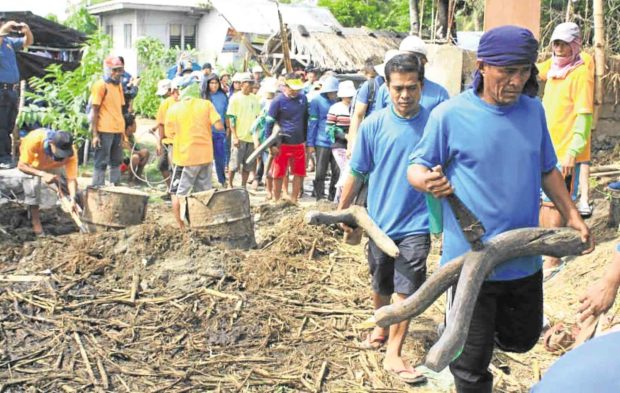
Farmers enter a portion of Hacienda Matias in 2015 after authorities demolished one gate that kept the government from enforcing land reform in the estate. —CONTRIBUTED PHOTO
LUCENA CITY — At least 35 farmers who went into hiding after being charged by a landowner with theft of crops that the farmers themselves planted are pleading for free legal services to fight their battles in court.
“We’re already tired of hiding,” said Maribel Luzara, head of Kilusang Magbubukid ng Bondoc Peninsula (KMBP), the group representing the wanted farmers, in a phone interview.
Criminal cases for crop theft had been dropped against the farmers, all agrarian reform beneficiaries, last week.
But warrants for their arrests are still live.
Luzara said the farmers had asked the court, which issued the warrants, to order police to not enforce the warrants.
“But we were told it was not that simple,” Luzara said. “Apparently, we badly need the services of a private lawyer.”
The problem is the farmers couldn’t afford lawyers’ fees, Luzara added.
She said the group relied only on legal help from the Department of Agrarian Reform (DAR).
The 35 farmers went into hiding since May 16 after warrants were issued for 19 cases of coconut theft and illegal sale filed by caretakers of Hacienda Matias in San Francisco town.
Though not covered by the warrants, Luzara joined the farmers in hiding.
Most of the farmers had been listed as agrarian reform beneficiaries by the DAR, while others were already in possession of certificates of land ownership awards, akin to a land title, for portions of the 1,715-hectare Hacienda Matias, mostly devoted to coconuts.
At least six children joined the farmers in hiding. Some had fallen ill.
One of the farmers, Samuel Cuervo, 62, died while the group was in hiding.
KMBP last week received a copy of the provincial prosecutor’s motion to withdraw the criminal cases against the farmers and referred the farmers’ plight to the DAR.
Cornelio Villapando, head of the DAR office in Quezon province that has jurisdiction over Bondoc Peninsula, said he would certify that the cases against the farmers were “not fit for trial.”
“Eventually, it will lead to the dismissal of the cases,” he said.
Luzara appealed to the Philippine National Police to form special “land reform desks.”
Luzara said the cases filed against the farmers were part of the landowners’ bid to evade agrarian reform.
“How can we steal something that we legally and morally own?” she said.
She said the Matias estate could no longer be considered private property.
Villapando said records showed that the estate’s seven land titles were now registered to the government.